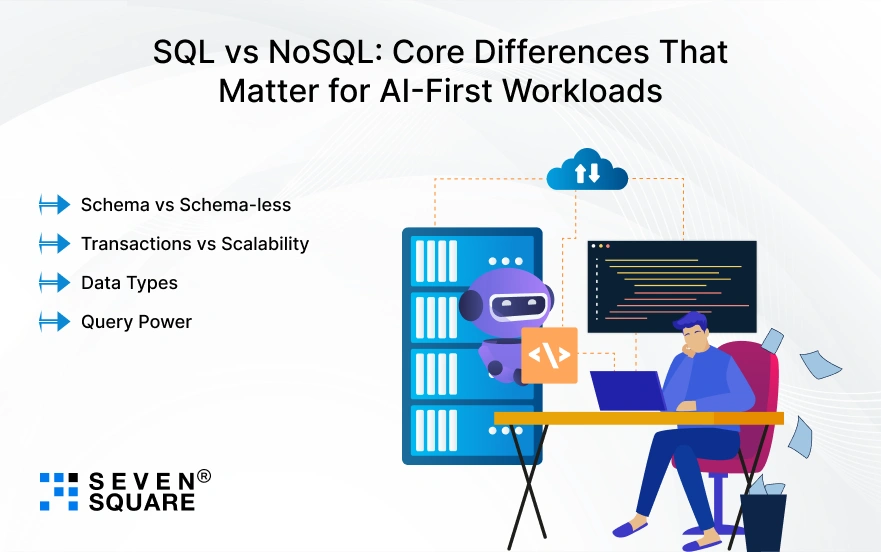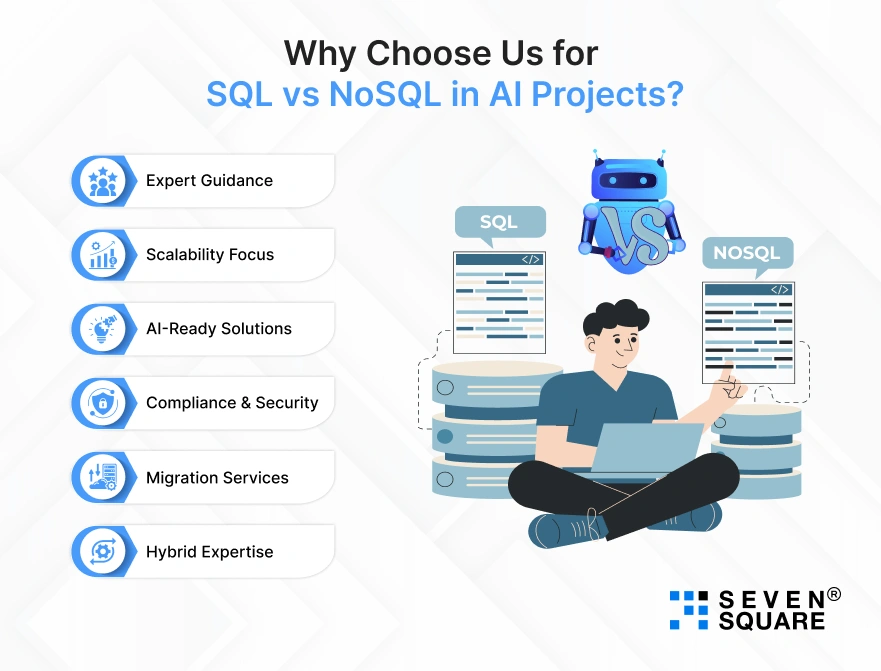The wrong database can sink your AI project before it even launches.
We’ve seen many teams hurry into building AI-first applications without asking the most important question: Which database fits best: SQL or NoSQL?
The SQL vs NoSQL debate has existed for years, but the rise of AI-first workloads makes this decision more critical than ever.
When you’re dealing with embeddings, vector search, & real-time recommendations, the SQL vs NoSQL difference for AI applications defines scalability, speed, & cost.
If you are trying to learn more about the difference about NoSQL vs SQL, then this blog is for you.
You will learn about the comparison between SQL and NoSQL to ensure the AI projects don’t just launch but grow at enterprise scale.
SQL vs NoSQL: A Quick Refresher (But with an AI Twist)
Before learning about the performance and cost, let’s go through the basics.
- SQL databases are structured, relational, and schema-based. They enforce strict rules, making them perfect for consistency, compliance, and analytics. Think PostgreSQL or MySQL.
- NoSQL databases, on the other hand, are flexible and schema-less. They come in document, key-value, and graph models. Popular examples include MongoDB, Cassandra, and Redis.
But here’s the AI-first twist: SQL was designed for structured data and transactions, while NoSQL was built for flexibility and unstructured content.
Modern AI applications deal with embeddings, vector databases, and knowledge retrieval.
The SQL vs NoSQL comparison determines whether your chatbot responds in milliseconds or your recommendation engine collapses under load.
At Seven Square, we analyze these differences with an AI-first lens because the SQL vs NoSQL difference in this context is business-critical.
Explore the MongoDB vs PostgreSQL Comparison.
SQL vs NoSQL: Core Differences That Matter for AI-First Workloads

Not all differences matter equally when it comes to AI-first systems. Here’s what really counts:
- Schema vs Schema-less: SQL requires a rigid schema. AI-first apps often work better with flexible, schema-less designs from NoSQL. But SQL with extensions like pgvector is catching up.
- Transactions vs Scalability: SQL excels at ACID transactions (think financial data). NoSQL scales horizontally, making it powerful for AI workloads that need massive, distributed datasets.
- Data Types: SQL handles structured data brilliantly. NoSQL shines when working with JSON, embeddings, and the messy reality of unstructured data that AI depends on.
- Query Power: SQL supports complex joins and analytics. NoSQL databases enable low-latency semantic search, critical for AI-first apps like RAG (Retrieval Augmented Generation).
This SQL vs NoSQL comparison for AI systems shows that choosing the wrong database could limit your app’s accuracy, speed, and growth potential.
That’s why Seven Square helps businesses match the SQL vs NoSQL difference to the workload that truly matters.
SQL vs NoSQL: Quick Comparison
Here you can go through a quick comparison between SQL and NoSQL to understand which one you should choose.
| Factor | SQL Databases | NoSQL Databases |
|---|---|---|
| Definition | Relational, structured, schema-based. | Non-relational, schema-less, flexible formats. |
| Data Model | Tables, rows, columns. | Documents, key-value, graphs, wide-columns. |
| Schema | Fixed, predefined, strict. | Dynamic, schema-less, adaptable. |
| Scalability | Vertical (scale-up). | Horizontal (scale-out). |
| Transactions | Strong ACID compliance. | BASE model, eventual consistency. |
| Query Language | SQL for structured queries. | |
| Performance | Best for structured queries & analytics. | Best for unstructured, real-time workloads. |
| Data Types | Handles structured (text, numbers). | Supports unstructured, semi-structured, embeddings. |
| Use Cases | Banking, ERP, BI, compliance apps. | AI, IoT, chatbots, recommendations. |
| Examples | MySQL, PostgreSQL, Oracle. | MongoDB, Cassandra, DynamoDB. |
| Flexibility | Rigid but reliable. | Highly flexible and adaptive. |
| Security | Strong compliance & role-based controls. | Varies, needs extra configuration. |
| Cost | Cheaper at start, expensive to scale. | Cloud-scalable, may cost more in the long term. |
| Hybrid Potential | Extensions like pgvector bridge AI. | Often combined with SQL for analytics. |
SQL vs NoSQL Performance: Which Wins for AI-First Applications?
Performance can make or break AI adoption. Imagine an AI chatbot taking seconds to respond & users drop off instantly.
- SQL (e.g., Postgres + pgvector) is excellent for structured queries and hybrid AI workloads that combine relational data with embeddings.
- NoSQL (e.g., MongoDB Atlas vector search) often leads in handling high-volume, low-latency vector queries, which power recommendation engines and semantic search.
When comparing SQL vs NoSQL performance differences, the answer depends on your workload.
For AI models, like large language models or real-time personalization, we’ve seen PostgreSQL perform beautifully for structured + vector needs, while MongoDB scales seamlessly for unstructured, high-speed scenarios.
Go through the comparison of PostgreSQL vs MongoDB for AI models to choose the right database for your business.
Cost Comparison: SQL vs NoSQL in AI Projects
Let’s see: Cost is often the deciding factor. But beware of hidden trade-offs.
- SQL databases (like PostgreSQL) are open-source and cost-effective, but enterprise scaling may add complexity in licenses, maintenance, and infrastructure.
- NoSQL databases (like MongoDB Atlas) can seem cheaper at first with flexible scaling, but ongoing costs for storage, compute, and distributed clusters may rise quickly.
In many cases, startups lean on NoSQL for speed, while enterprises with compliance and long-term workloads often find SQL more cost-efficient.
This is where a real SQL vs NoSQL cost comparison matters, not just list prices, but total cost of ownership.
SQL vs NoSQL in Real AI Use Cases
We see how SQL vs NoSQL for generative AI plays out in real projects. Here’s what we’ve learned from building AI-first applications for our clients:
- Chatbots & RAG (Retrieval Augmented Generation): When speed matters, MongoDB or Elasticsearch often lead with high-performance vector search. But Postgres + pgvector is becoming a strong challenger, combining relational consistency with embeddings.
- Recommendation Engines: When millions of interactions need real-time personalization, NoSQL often wins for scale thanks to its distributed architecture.
- Enterprise Analytics & Compliance: In industries like finance or healthcare, SQL databases are often preferred because of strong ACID compliance, structured data, and governance requirements.
- Hybrid Approach: For many AI-first workloads, the smartest play is not “SQL vs NoSQL,” but SQL + NoSQL together. For example, structured analytics in SQL with unstructured vector search in NoSQL.
This shows that the SQL vs NoSQL scalability comparison isn’t about declaring one winner; it’s about matching the right tool to the right AI use case.
Why Choose Us for SQL vs NoSQL in AI Projects?

Whether it’s the SQL vs NoSQL difference or a comparison between SQL and NoSQL, our team ensures you pick the one that drives growth.
- Expert Guidance: We simplify the SQL vs NoSQL comparison so you know exactly which fits your AI workload.
- AI-Ready Solutions: From RAG, chatbots, LLMs, to recommendation engines, we design optimized SQL and NoSQL architectures.
- Scalability Focus: We evaluate SQL vs NoSQL scalability comparison to ensure your database grows with your AI application.
- Compliance & Security: Need structured data for finance or healthcare? SQL. Need flexibility for unstructured data? NoSQL. We guide you on both.
- Hybrid Expertise: Sometimes, the smartest play is using SQL + NoSQL together. We architect hybrid systems that give you the best of both.
- Migration Services: Avoid downtime and risks with our database migration services customized for AI systems.
Want to Integrate a Database? Contact Us Today!
SQL vs NoSQL: Which to Choose for Your AI-First Application? (Decision Framework)
The question most business owners ask us is simple: “SQL vs NoSQL: which is better for AI?” Our answer is: it depends on your workload.
- Choose NoSQL if your AI app requires fast prototyping, unstructured data handling, or massive scalability (e.g., chatbots, recommendation engines).
- Choose SQL if you need compliance, financial transactions, or analytics where data accuracy and governance are mission-critical.
- Choose Hybrid (SQL + vector store) if you’re building complex LLM applications where structured + unstructured data must work together.
The Database You Choose Changes Your AI Future
The comparison between SQL and NoSQL has no one-size-fits-all winner.
For some AI-first applications, SQL delivers compliance and analytics.
For others, NoSQL enables flexibility and scale. And often, the best approach is a hybrid.
We match your database choice with your AI vision.
Before you decide, let’s go through your AI workload together and recommend the right SQL vs NoSQL path for success.
FAQs
- SQL handles structured data with strict schemas, while NoSQL supports flexible, unstructured data.
- In AI, this difference impacts scalability, embeddings, and query performance.
- For generative AI, NoSQL often wins for scalability, but SQL with extensions like pgvector also performs well.
- The choice depends on workload and compliance needs.
- Not always. NoSQL may seem cheaper initially, but it can grow expensive at scale.
- SQL often wins in enterprise cost efficiency. A cost audit is essential.
- PostgreSQL is open-source, reliable, and with pgvector, supports embeddings.
- It’s often chosen for compliance and hybrid AI workloads. MongoDB is best for flexible scaling.